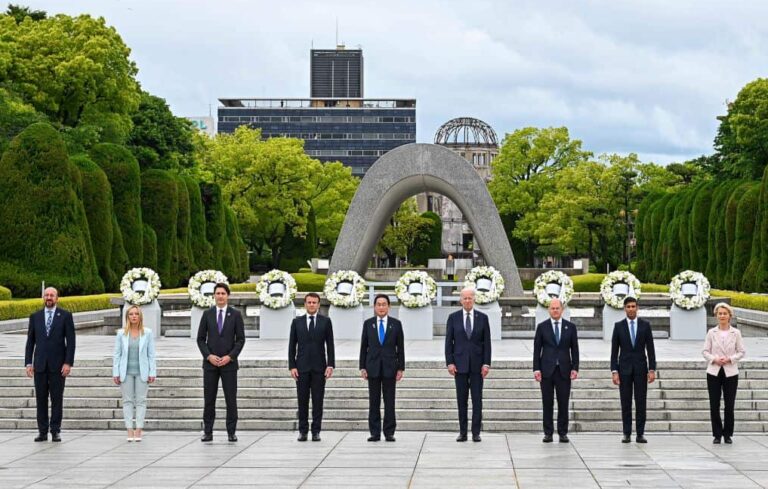The city of Hiroshima, Japan, is hosting the new G7 summit from 19 to 21 May. The leaders are meeting with one main topic on the agenda. Namely, a likely tightening of sanctions against Russia for its invasion in Ukraine, with the aim of targeting its gas and oil exports and its imports of commercial goods, at least in the defence sector.
Furthermore, the plan is to further target the circumvention of sanctions already in place through ‘triangulations’. Among other topics at the G7, besides the Ukraine chapter, relations with China, nuclear disarmament and climate change will also be discussed.
Table of Contents
G7 in Hiroshima, the leaders present
The summit comes after Zelensky’s European tour. And follows the work of the Council of Europe in Iceland by a few days. The idea is to show further support for Kiev, which has been engaged in a military counter-offensive in recent weeks.
The Ukrainian president is expected to intervene. But, it is not yet clear whether virtually or in person. In attendance was Joe Biden, who said: ‘The G7 is more united than ever’. Thus the speculation that the US president might cancel the trip because of the debt crisis he is grappling with at home has been disproved.
All the leaders of the other G7 countries attended, from Giorgia Meloni for Italy to Emmanuel Macron for France. From Rishi Sunak for the UK to German Chancellor Olaf Scholz and Justin Trudeau for Canada.
Doing the honours is Fumio Kishida, Prime Minister of Japan. Also representing the EU are European Council President Charles Michel and European Commission President Ursula von der Leyen.
The goals of the summit
The final communiqué of the G7 has not yet been finalised. However, anticipations have come from the Financial Times. According to which, the G7 and the EU want to further reduce the use of Russian energy raw materials ‘including by preventing the reopening of routes previously closed by Moscow in its use of energy as a weapon’, at least ‘until the end of the conflict’.
The aim is that no country changes its mind in the future. It will also try to give investors confidence to support liquefied natural gas (LNG) projects and infrastructure, both in Europe and North America.
The move is considered very symbolic in the plan to emancipate itself from dependence on Russian energy. As for the Russian oil embargo, it will be discussed as part of the 11th EU sanctions package.
New alignment on sanctions to Russia
The goal of the G7 summit is also to align the members on the approach to trade sanctions, at least for certain categories of goods, reversing the logic in force now.
At the moment all goods can be sold to Russia unless they are blacklisted. In the future they should all be automatically banned. Except for a few that will be on a list of authorised products.
The aim is then to target sanctions circumvention via third countries. As is currently the case with China, Turkey, and the United Arab Emirates, for example for aircraft spare parts, as revealed by the New York Times.
Russia, through Dmitry Medvedev, has threatened that it will respond to any export bans by putting an end to the wheat agreement. Which expires on 18 May.
Read also: Putin threatens the West, again: what he said during the Victory Day parade












